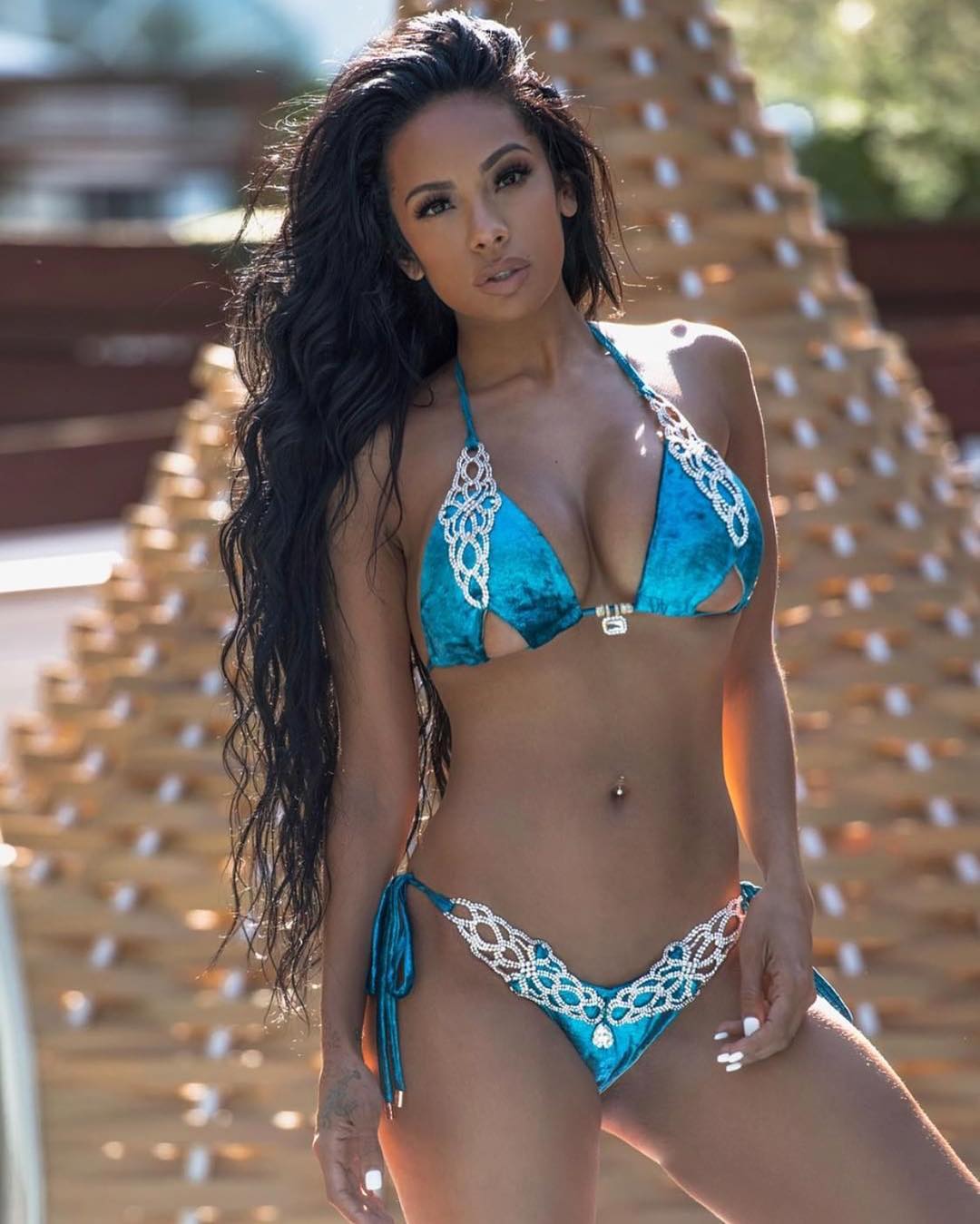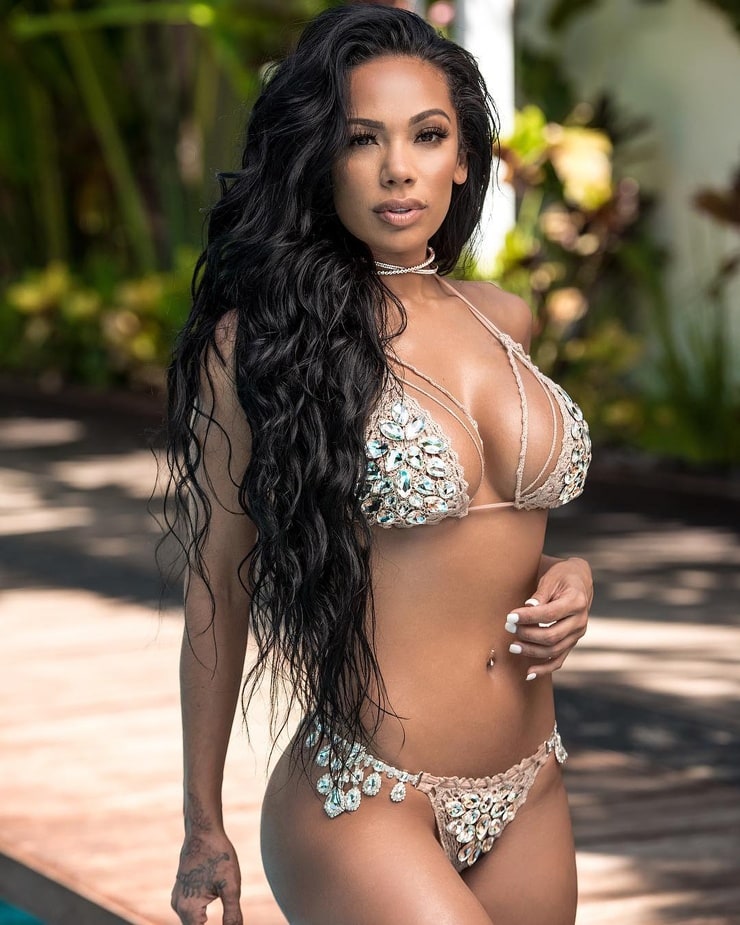Is the world of reality television and social media blurring the lines between fame and notoriety, particularly when it comes to the intimate details of celebrities' lives? The relentless pursuit of clicks and views has created an environment where privacy is a commodity and personal moments are often exploited for public consumption.
The subject of this exploration, Erica Mena, a multifaceted figure who has carved a distinct path through the entertainment landscape, provides a compelling lens through which to examine these evolving dynamics. From her early days as a video vixen to her current status as a reality television personality, Mena has consistently been in the public eye, navigating the complexities of fame with both resilience and vulnerability. Her presence on shows like "Love & Hip Hop" has solidified her place in the cultural zeitgeist, and her name frequently surfaces in discussions about relationships, scandals, and the ever-present lure of online content.
| Attribute | Details |
|---|---|
| Full Name | Erica Mena |
| Date of Birth | November 8, 1987 |
| Birthplace | New York City, New York, USA |
| Occupation(s) | Reality Television Personality, Model, Singer, Video Vixen |
| Years Active | 2000s Present |
| Known For | "Love & Hip Hop" franchise, Music videos, Social Media Presence |
| Television Series | Love & Hip Hop (New York, Atlanta), Kourtney & Khloe Take Miami, The Show with Vinny, The Trisha Goddard Show, 106 & Park, CSI: Cyber, Bad Girls Club, Wild 'n Out, Master of None, Scared Famous, Black Ink Crew New York |
| Marital Status | Divorced (From Safaree Samuels) |
| Children | 2 |
| Associated Acts | Bow Wow, Joe Budden, Safaree Samuels |
| Height | 5' 6" (168 cm) |
| Official Website (if available) | IMDB Profile |
The digital age has ushered in a new era of accessibility, where information, both authorized and unauthorized, can spread with unprecedented speed. This dynamic has created both opportunities and challenges for those in the public eye. Celebrities, influencers, and public figures are constantly under scrutiny, and their every move is subject to commentary, speculation, and often, intense criticism. The rise of platforms like OnlyFans has further complicated this landscape, providing a space for individuals to monetize their personal content, which raises complicated questions about consent, privacy, and exploitation.
Mena's career has been marked by moments of both triumph and controversy. Her relationships, in particular, have been fodder for public fascination, with her romantic involvements often playing out on camera and generating headlines. The drama, the breakups, and the public feuds have all contributed to her notoriety. While the exposure has undoubtedly helped her build a brand, it has also exposed her to intense public scrutiny. The threat of leaked content, or the actual dissemination of intimate material, becomes a constant shadow, impacting personal safety and well-being.
The entertainment industry, with its often-unforgiving nature, often capitalizes on controversy. The "sex tape" narrative, for instance, becomes a potent tool for generating buzz and attracting viewers. This phenomenon is not unique to Erica Mena. It's a recurring theme throughout the celebrity landscape. The commodification of intimacy, where private moments are transformed into public spectacles, reflects a troubling trend in popular culture.
The discussion surrounding Mena and the potential for leaked intimate content raises broader questions about agency and control. It prompts us to consider the ethical responsibilities of media outlets and platforms. The line between reporting and exploitation becomes increasingly blurred in the pursuit of clicks and views. The speed with which such information can spread online exacerbates the potential for harm, leaving individuals vulnerable to online harassment, cyberstalking, and the lasting emotional impact of having personal moments exposed to the world.
The legal and ethical frameworks surrounding the distribution of explicit content are complex and often inadequate. Laws vary from jurisdiction to jurisdiction, and enforcement is often slow and challenging. The anonymity afforded by the internet can embolden those who seek to exploit or harass others, making it difficult to hold perpetrators accountable. The ongoing struggle to balance freedom of expression with the protection of individual privacy remains a defining challenge of the digital age.
The "sex tape" narrative, as it applies to Mena, also highlights the double standards that often exist in the entertainment industry. Women, in particular, are often judged more harshly for their sexuality, while men are often given more leeway. This discrepancy creates an environment where women are more vulnerable to exploitation and where their reputations can be unfairly damaged.
In the context of this, the role of social media must be scrutinized. Social media platforms, while providing avenues for self-expression and connection, can also become breeding grounds for negativity and the dissemination of harmful content. The algorithms that drive these platforms often prioritize engagement, regardless of the ethical implications. The resulting echo chambers can amplify negativity, creating cycles of harassment and abuse that are difficult to escape.
It's crucial to remember that Erica Mena, like all individuals, is more than the sum of her public appearances. She is a person with her own vulnerabilities, experiences, and aspirations. The constant scrutiny to which she is subjected should not be seen as an invitation to condone or ignore potential violations of her privacy.
The media's portrayal of Mena is a reflection of broader societal trends. This involves the intersection of celebrity culture, social media dynamics, and the ethical challenges of the digital age. It also serves as a reminder of the importance of empathy and responsible media consumption.
The conversation surrounding Menas career also touches upon the larger issues within the music industry. As a singer, her creative endeavors are not solely based on her personal life, as her music, image, and brand are carefully constructed, and often strategically managed by managers and record labels. She has released singles and participated in collaborative musical projects.
Furthermore, Mena's career reveals the evolving nature of the entertainment industry. With the rise of streaming services and social media, artists have greater opportunities to connect with their audiences directly. Mena utilizes this capability to cultivate her brand. However, this shift also means that her public image can be managed, and manipulated, which affects both her personal and professional life.
The frequent mentions of platforms like Pornhub and OnlyFans in this context necessitate a discussion of the sex industry and its intersection with celebrity culture. The availability of adult content online poses a serious challenge. This is the issue of consent, exploitation, and the potential for harm that arises from the distribution of private material.
The increasing interest in Mena is also a reflection of the changing relationship between celebrities and their fans. She has developed a strong following, and this engagement drives a cycle of attention and publicity. The public appetite for gossip, drama, and intimate details remains very strong, and celebrities often feel compelled to share more of their lives to stay relevant. This creates a constant tension between the desire for privacy and the demands of celebrity life.
The legal and ethical implications also arise in the discussion of potentially leaked or private content. Revenge porn and non-consensual distribution of explicit material are illegal in many places, and platforms have a responsibility to protect the privacy of their users. There are complex legal cases associated with leaks, and in cases of the distribution of private material, these incidents often have severe emotional and psychological consequences.
Its crucial to consider the power dynamics in the media, where often, certain figures are subjected to disproportionate scrutiny. In the case of women of color in entertainment, these figures may encounter different forms of bias that negatively influence their public perception. The intersection of race, gender, and sexuality further complicates their ability to control their narratives.
Ultimately, the story of Erica Mena, as explored in this examination, reveals broader themes that are significant in modern entertainment. These include privacy, the role of social media, and the impact of celebrity culture. The discussions around her illustrate the need for greater accountability, ethical awareness, and the protection of individual rights in a digital age.


